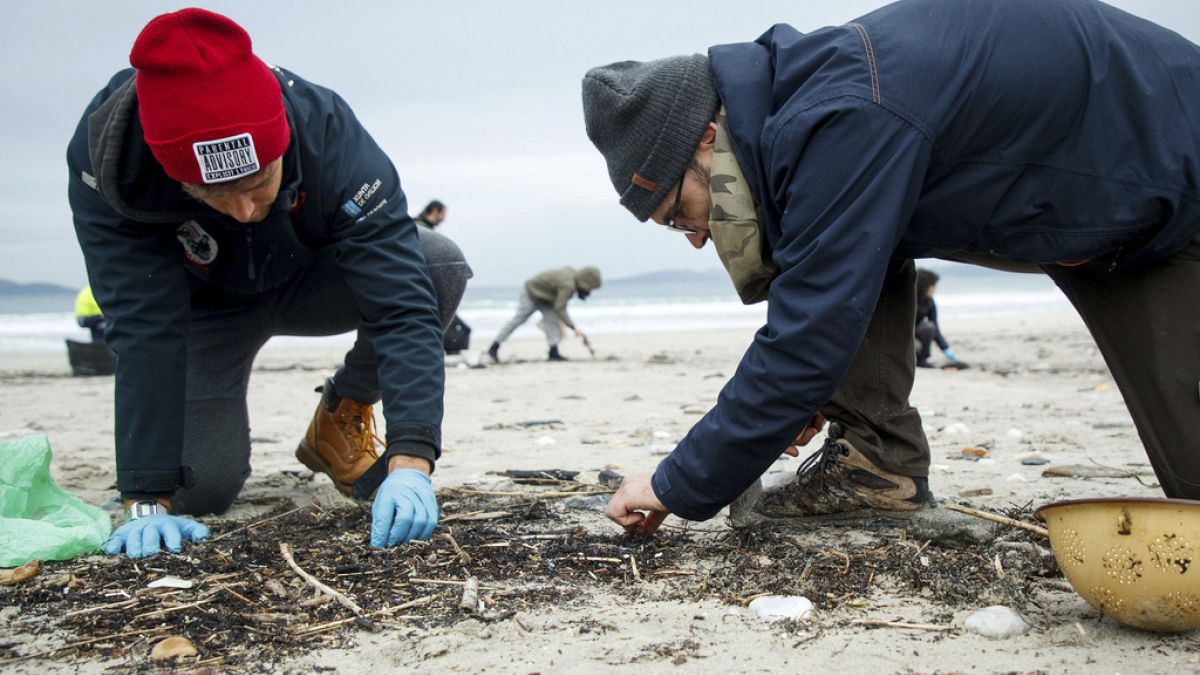As officials from nearly 200 countries convened in Colombia this week to discuss implementing a global pact to reverse biodiversity loss, and prepare for crunch climate talks in Azerbaijan in November, yet another major environmental threat – plastic pollution – is the focus of a separate UN summit.
Scientists have warned of the growing threat of plastic pollution across the globe, but back room negotiations this week on a European law to tackle plastic pellet loss hint at the difficulty of forging consensus between governments.
“The more we know, the worse the situation appears,” said Winnie Lau, a researcher with the Pew Charitable Trusts who presented preliminary data on the scale of the problem at a forum today hosted by the European Commission and Hungary, current EU Council presidency holder.
Around a third of all plastic pollution is microplastics – particles from 5mm down to microscopic levels – which are either made that size, like the raw plastic pellets or ‘nurdles’ used to make other products, or result from the breakdown of larger plastics.
Lau estimated the amount released into the environment in 2019 at 11.4 million tonnes, with the main sources being tyres and paint, followed by mechanical recycling, plastic pellets, textiles and particles intentionally added to cleaning and personal care products.
“To give you a sense of scale, 11.4 million metric tons is equivalent to a fully loaded shipping container of microbeads entering the environment every two minutes,” Lau said.
Microplastics are now everywhere – including inside us
Richard Thompson, an academic with the distinction of having coined the term microplastics in a research paper in 2004, has just published a review of the research that has been done in the area over the subsequent 20 years.
“What the science is now showing us is that microplastic pollution is literally everywhere, from our highest mountains to our deepest oceans,” Thomson said. “And, of course, they’re also present in all of the species across the planet as well.”
All this will need to be in the minds of negotiators when they convene in Busan, South Korea, on 25 November for the fifth session of the Intergovernmental Negotiating Committee (dubbed INC-5) to develop an international treaty on plastic pollution.
“It’s going to be really essential to take a whole systems approach.” Thompson said. “But that needs to be also guided by independent scientific evidence – evidence that’s not in some way compromised by conflicts of interest from industrial commercial gain.”
The EU has been intensifying its attack on plastic pollution in recent years, with a ban on disposable plastic items like straws, cutlery and cups followed more recently by a gradual phase out of a range of ‘intentionally added’ microplastics under EU chemicals regulation – notably the rubber infill in sports pitches made of ground up tyres.
Recent major spillage in Spain focused attention on issue
Transition periods of up to 12 years for some categories of products reflect the concern of industrial sectors and result from lengthy negotiation behind closed doors. Now government delegates are working on the first proposal to legislate on unintentional release of microplastics – specifically the nurdles mentioned above.
But a bid by Hungary to move talks forward failed on Tuesday (22 October), with national delegates split over a compromise proposal, seen by Euronews, that would exclude seaborne cargos of plastic pellets from the system of controls and penalties under the proposed regulation.
Several EU countries – including Germany, Greece, Italy and Poland – have made it clear they oppose the inclusion of shipping in the EU legislation, arguing the issue should be handled by the International Maritime Organisation, a UN body.
Activists, mindful of the recent major spillage that washed up on the shores of Spain, criticised the failure of governments to extend the Commission’s proposal to cover maritime transport of pellets, as the European Parliament has agreed.
“The environmental disaster in Galicia, caused by the loss at sea of containers of pellets, underlined the urgent need to incorporate maritime transport into the regulation,” said Lucie Padovani, European policy officer on plastic pollution for Surfrider, an NGO.
The EU executive itself is clearly aware of the issue. “Obviously there is, especially with the latest accidents in EU waters, a need for action,” said Mikhel Krusberg, a policy officer at the Commission’s environment directorate, who worked on the original proposal.

